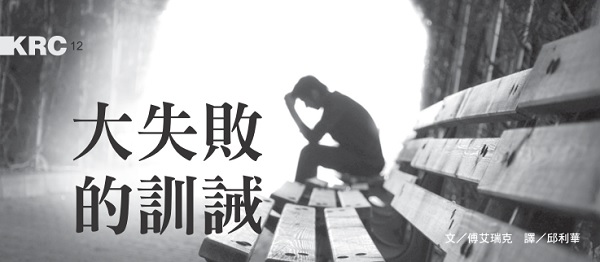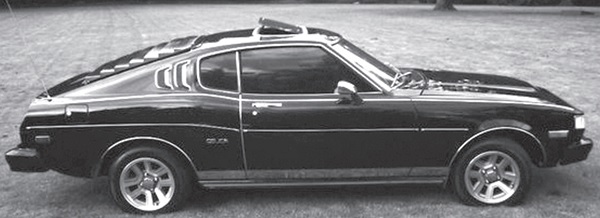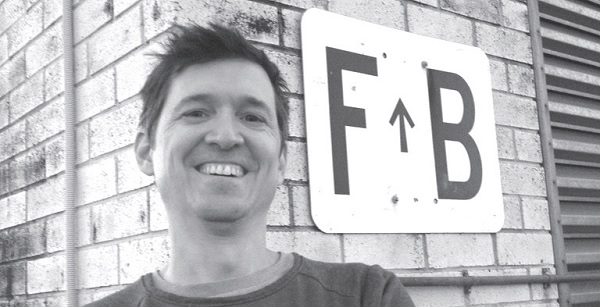Discipline of great failure
Photo courtesy/Eric Fu
Translated by Qiu Lihua

Not long ago, inspired by my daughter, I wrote an article: "Becoming a Big Winner", which talked about the importance of remembering the experience of being a big winner in life. After reading it, a friend asked me, "Why don't you write about the experiences of big failures? In fact, people want to know more about those experiences."
He was so right! I have witnessed many huge failures, which have far more impact on people than the big winners; and sometimes, some regrets and regrets are even more so.
When I think about failure, I think of thrilling triathlons and other life-or-death losses. The first big financial loss in my life was my beloved purple Toyota Selica sports car when I was sixteen years old.

▲The purple Toyota Selica sports car that Eric Fu loved when he was sixteen.
My father is a traditional Lutheran pastor, and I was surprised that I could convince him to choose such a purple and sports car. Occasionally he would let me drive the car. One morning there was a Florida-style storm, so I decided to drive it to school instead of riding my bike. I parked in the school's huge parking lot and stayed in the car to see if the rain would stop. But the rain not only kept coming, but got heavier and heavier. I had to quickly pick up all my belongings and run to school.
When school was over, I went to the parking lot to go home, but I didn't even see the Celica. I didn't feel much at first, but after I searched for a while, my heart suddenly sank and I felt that the situation was not good.
"Oops! The car is missing!"
There were so many thoughts in my mind - "Did I drive to school? Did I park the car somewhere else? Did my mother come and drive the car away?" I called my mother and asked, but she said she never came.
Then I suddenly realized: "The car was stolen!"
My heart is very heavy and very sad. I thought about it: "How could this happen? Did someone take my car keys from the school locker room? Did I drop my keys outside the car?"
Or..., no, "I didn't turn off the lights, turn off the ignition, or lock the door. It's like putting a big sticker on the car - come and steal me?!"
I then had to explain it all to my dad, to the principal, and then to the police, which made the whole thing even more brutal.
A few months later, police found the car, stripped of all its parts. They put the parts back together, but Dad sold the car. For quite a long time, this matter was a sore point that we could not touch. However, when I was eighteen, my dad allowed me to take a long trip from Florida to Colorado with two friends in his station wagon. This tells me that He has forgiven everything and trusts me again.
This first tragic loss taught me many things: about responsibility, about value, about forgiveness.
Not all failures and losses are life-or-death, but they can cause harm and be the driving force behind the harm to health and life. When I fail, I like to use the following methods to stay on track:
‧ Thank God for all the rewards, and also thank God for all the things he receives;
‧ Ask God to forgive yourself and others (for all the wrong things you have done and the things you should have done but failed to do);
‧ Summarize and learn from failures;
‧ Keep moving forward with faith and courage.
Starting over seems to be one of the secrets of great lifelong investors. According to Alice Schroeder's 2008 biography, Warren Buffett once said that the way he clears his mind in order to "forward" is like filling and emptying a bathtub.
As I think about my big failures and big regrets, I remember a time when my family went to Two Island Head, Queensland, Australia, and stayed for a week in a lighthouse keeper’s cabin, one of my favorite places in the world. one. During my stay in the cabin, Facebook’s stock had just gone public and was falling sharply because people thought the “money situation” was not good. I was particularly curious, so I made an evaluation of the company and found that if several indicators were met, Facebook's stock price could almost double its price at that time. The next morning, I boarded the lighthouse at sunrise, and when I turned around I saw this sign (pictured):

▲ Eric Fu and the FB sign he saw when he climbed to the lighthouse.
"FB" happens to be Facebook's stock code. I couldn't help but think: "Isn't this a sign? Does it mean that Facebook will increase in value a lot? Even more than I can imagine?" I laughed, because people always like to look for signs - especially when it comes to money. Now an unmistakable sign is right in front of me, concerning one of the hottest topics in the financial media at the moment, and it’s on top of an incredibly beautiful lighthouse!
At that time, the profitability of Facebook had not yet become apparent, and I actually did not think it was a sign from God sent to me from heaven, because the Bible always warns us not to seek signs, so I controlled my enthusiasm. But I loved this legendary experience so much that I took note of my reaction to the sign and my findings; I also took action, made appropriate investments, and set a sale price. Later, the stock rebounded and rose and reached the predetermined selling price, so I sold all the stocks.
But what happened next, just like losing the purple Selica, made my heart sink suddenly.
Facebook stock kept rising and rising, well above what I sold it for.
There was a time when stocks soared and more good news came out, and regret would torture me: "Should I have waited longer? Should I have invested more? Should I have invested more?" As a financial steward, can I do better?"
People often ask themselves questions like this and cling to stories like these. I have counseled many people through experiences filled with regret, some of which were dramatic and tragic. According to the "Bank Rate" research report, 75% Americans all have financial regrets. People may only have a few big failures or losses in their lives, but they will have countless missed investment opportunities, missed business deals, or missed beautiful homes. If you allow it, regrets of all kinds can accumulate and linger. Regret sometimes involves difficult issues of personal responsibility, as well as “big mistakes” that, with the benefit of hindsight, seem so wrong.
Some mistakes are much more serious than financial mistakes. “Once-in-a-lifetime” investment opportunities may reappear every few days, but other types of opportunities may be less likely to reoccur frequently, such as life-saving opportunities, regaining confidence, or repairing relationships.
Just like dealing with big failures, we also have several steps to deal with big regrets and make every day a new day:
1. Listen:In your daily journal, there is a page titled "Listening." Whenever you have regretful thoughts or new ideas, write them down, start a tracking system, ask for help, and allocate some time to do it.
2. Contentment:Find the part that satisfies the past or present and define what satisfies it. 1 Timothy 6:6 states: “Godliness with contentment is great gain.”
3. Find inner motivation:Risk-taking and growth require drive and stamina that sometimes require greater vision and motivation to grow. The parable of the talents may serve as an inspiration (see Matthew 25:14-30).
4. Guard your heart:There is an old proverb that says: "Don't let a mistake become a mistake!" If you keep replaying a certain mistake or loss in your mind, it will inject greed or fear into it, which may make you encounter a worse situation.
My prayer for you today is this: Be a good steward and take away the burden of all your losses so that you can be ready for opportunities:
Give alms where God calls you;
Love where you feel;
Take risks with wisdom and confidence.
 Author profile
Author profile
Eric Vogen, founder and CEO of Vision Capital & Management, holds a master's degree in business and holds a CFP certificate. He has more than 20 years of practical experience in securities investment.
 Translator profile
Translator profile
Qiu Lihua, from China, once taught in the foreign language department of the university. Now living in Southern California, USA, he has served at Clear Spring Valley Christian Church for many years. Currently working at a Christian private high school. Like all good things.
